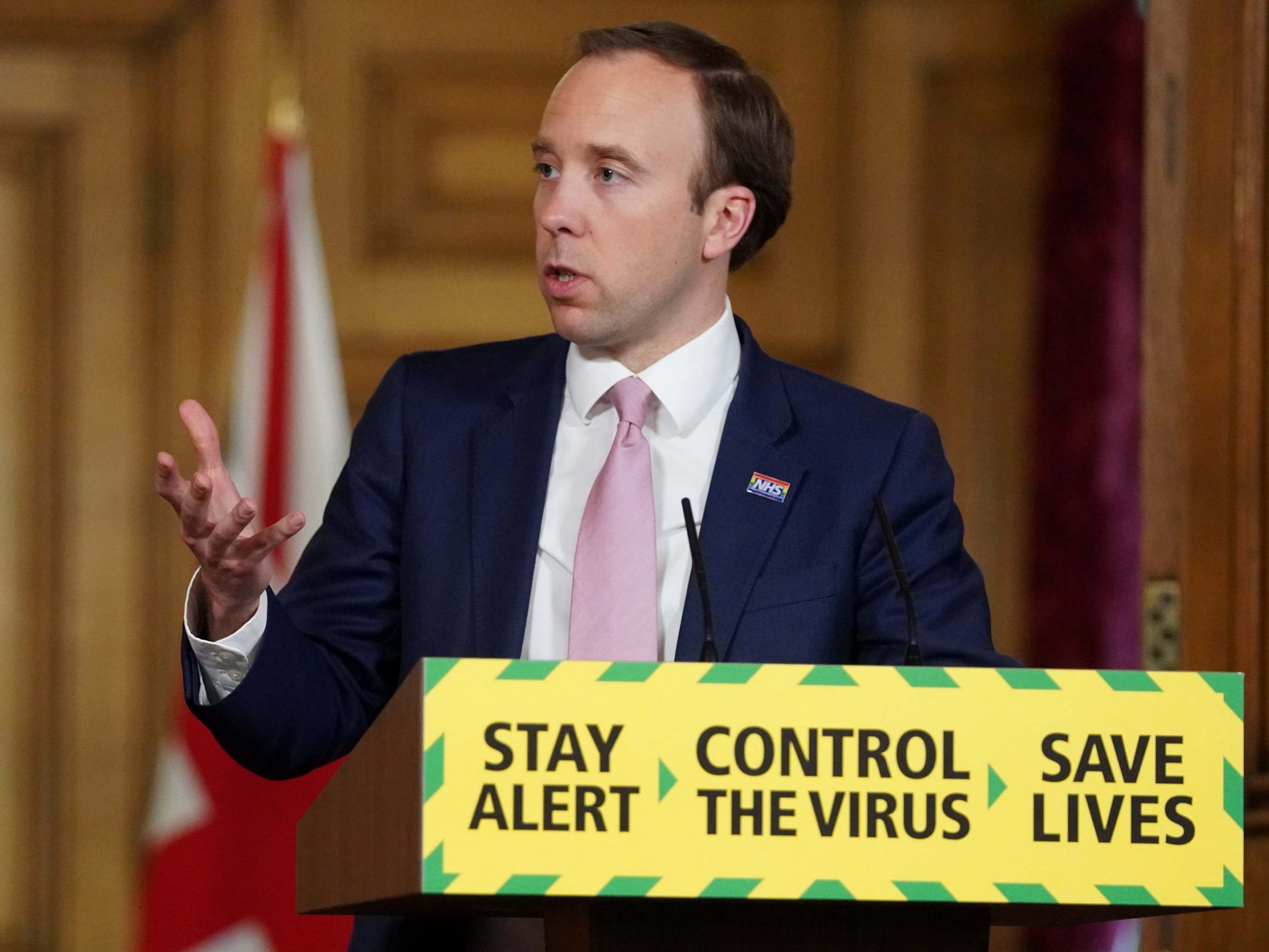Coronavirus: Hancock’s £13.4bn debt ‘write-off’ for NHS could cost hospitals millions every year
Exclusive: Debt-ridden trusts will now face having to pay an annual charge with costs still exceeding their income

Matt Hancock’s promise to “write off” £13.4bn of debt owed by NHS trusts ahead of the worst of the coronavirus crisis could end up costing hospitals millions in annual payments back to the government, The Independent has learnt.
Experts have warned that the way the government converted the billions of pounds owed by effectively insolvent NHS trusts will mean hospitals having to pay an annual charge on their assets back to the government in perpetuity.
It also failed to fix the underlying shortfall in hospital funding, with many trusts unable to meet the costs of providing services with the income they receive from NHS England. Without reform, some could build up debts again within a few years.
Anita Charlesworth, director of research and economics at the Health Foundation, told The Independent: “What the government has done is convert the debt into an equity share. Writing off this debt is not cost free. This is a better deal for NHS providers, but there will be a charge.”
The move created a “window of opportunity” for some trusts who had built up significant deficits to get back on a sustainable footing, she said.
“There is no guarantee of that. It remains the case that even with this, this reset is only really valuable if there’s enough revenue in the system to ensure that on an ongoing basis trusts have enough income to meet their day-to-day running costs and pay their PDC [public dividend capital],” she added.
“If there isn’t sufficient funding in the system, for the overwhelming majority of trusts, then we will be back in this position in a few years’ time.”
At the start of April, health secretary Matt Hancock announced the government was “writing off” £13.4bn of revenue debt, needed for day-to-day spending, which was owed by more than 100 NHS trusts. In total 107 NHS organisations had an average of £100m debt each, with two trusts having debts totalling £1bn.
The debt was built up during years of austerity as hospitals were forced to provide services with less and less income and many having to apply for interest bearing loans from the Department of Health and Social Care (DHSC).
Some of these loans earned the DHSC interest of more than 6 per cent and pushed many hospitals further into the red.
By converting the debt into what is known as PDC, the government has effectively invested the sum of money owed by each hospital back into the trust. Normally PDC is used to fund capital works like the construction of new wards or buildings.
Under Treasury rules PDC carries an annual 3.5 per cent charge, or dividend, to repay the taxpayer for its investment. A complex calculation based on a mix of the hospital’s assets determines how much money has to be paid each year and this depreciates as the assets age and lose value.
Given the scale of debt converted to PDC, experts believe it is likely to still cost hospitals millions of pounds.
As a result of the coronavirus pandemic, experts say the NHS cost base – ie what it needs to provide healthcare – will be radically different to what it was before the pandemic and a new financial settlement with the government will be needed.
Emma Knowles, director of policy and research at the Healthcare Financial Management Association, the professional body for hospital finance directors, told The Independent: “Our members have been concerned about how cash flows around the NHS for some time now.
“The transfer of loans to public dividend capital is a pragmatic solution and is welcomed as it brings some certainty to managing working capital and the cash position in the short term. It also eliminates valuable management time spent constantly applying for and managing the short-term loans and recognises that some organisations would be unlikely to pay back the loans however long the term.”
But she added: “It is not, however, without cost. The organisations that have benefited from the transfer will continue to incur a cost each year on the new public dividend capital although it will no longer be in the form of interest payment. The impact will vary from organisation to organisation.”
She said the government’s decision solved past financial problems but that some NHS hospitals would need ongoing support to cover their costs or “the cycle will start again”.
She said adequate funding was needed for the NHS as a whole including a review of how money flows from the Treasury through the DHSC via NHS England to frontline NHS services.
A DHSC spokesperson said: “The NHS is on the front line in tackling this virus and we are incredibly grateful to the efforts of staff in helping to tackle this pandemic. We are aware that some trusts may have a higher overall finance cost following the write-off and adjustments will be made to ensure these trusts are not negatively affected by this.”
They did not address whether the DHSC would continue to require annual payments as required by existing rules on public dividend capital.
The government has promised a review of the PDC dividend rate and said any change will apply to all organisations.
Join our commenting forum
Join thought-provoking conversations, follow other Independent readers and see their replies
Comments
Bookmark popover
Removed from bookmarks